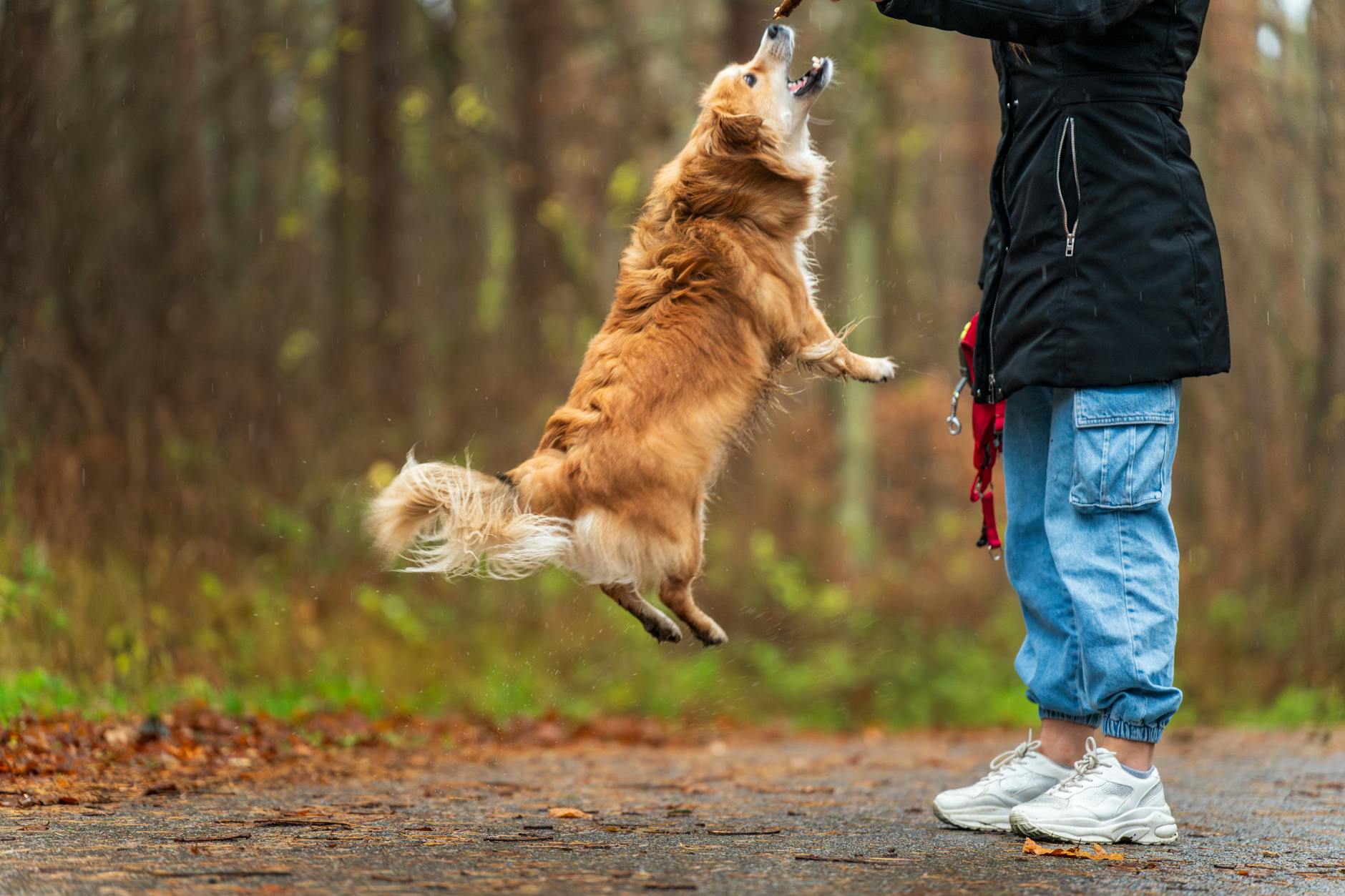The Unbreakable Bond: Coping with the Loss of a Soul Dog and Opening Your Heart Again
My heart still aches when I think of Buster, my goofy golden retriever. He wasn't just a dog; he was my shadow, my confidant, the furry alarm clock who greeted every morning with unbridled enthusiasm. He was, without a doubt, my soul dog. The bond we shared was a tapestry woven with countless walks, shared secrets whispered in the park, and the quiet comfort of his head resting on my lap after a long day.

A joyous leap of faith and fur: Remembering the playful moments with Buster, capturing the essence of unconditional love.
But as all pet owners know, this profound love comes with an inevitable heartbreak. Saying goodbye to Buster was one of the hardest things I've ever done. The silence in the house was deafening, the empty leash a constant reminder of his absence.
If you're reading this, chances are you understand this pain. You've experienced the unique and devastating grief that comes with losing a beloved pet. This article is for you. It's a guide to navigating the grieving process, and, when you're ready, considering the possibility of opening your heart and home to a new companion. Importantly, it's also about ensuring that any future furry friend receives the best possible care.
1. Understanding the Depth of Grief: Why Losing a Pet Hurts So Much
Losing a pet isn't "just" losing an animal; it's losing a member of the family, a piece of your heart. The unique relationship we have with our pets is built on unconditional love and unwavering companionship. They offer a level of affection that's rare and precious. They don't judge or criticize; they simply love you for who you are.
Our pets also become integral to our daily routines. Their needs dictate our schedules, providing a sense of purpose and stability. The loss of that routine can be incredibly disorienting. Furthermore, pets are often our silent listeners, the recipients of our joys, sorrows, and anxieties. They offer a safe space to vent without fear of judgment.
Unfortunately, society often downplays the significance of pet loss. People who haven't experienced this bond may not understand the depth of the grief, leading to insensitive comments or a lack of support. It's crucial to remember that your grief is valid, regardless of what others may say or think. Allow yourself to feel the pain without shame or guilt.
Common grief reactions can be emotional, physical, and behavioral. Sadness, anger, guilt, denial, anxiety, and loneliness are all common emotional responses to pet loss. Grief can manifest physically in the form of fatigue, changes in appetite, sleep disturbances, and even physical pain. Social withdrawal, difficulty concentrating, irritability, and restlessness are also common behavioral reactions.
2. Navigating the Grieving Process: Healthy Coping Mechanisms
There's no right or wrong way to grieve, and there's no set timeline. Be patient with yourself and allow yourself the time and space you need to heal. Here are some healthy coping mechanisms that can help:
Resist the urge to suppress emotions. Trying to bottle up your feelings will only prolong the grieving process. Allow yourself to cry, to feel angry, to feel sad. Journaling can also be a therapeutic outlet. Writing down your thoughts and feelings can be a powerful way to process your grief. It can help you identify and understand your emotions, and it can provide a sense of release. I remember after Buster passed, I filled an entire notebook with my memories of him. It was painful, but also cathartic.
Creating a tangible memorial can be a comforting way to honor your pet's memory. Consider creating photo albums, memory boxes, or even a memorial garden. Focus on the joy and love your pet brought into your life. Share stories and memories with friends and family, celebrating their life and legacy.

A cat jumps onto a stone wall in a Turkish cemetery filled with Ottoman-era graves, perhaps a reminder that while memorials can be a way to cope with loss, life goes on.
Seeking support is also important. Talk to friends and family who understand the bond you shared with your pet. Connecting with others who are experiencing similar grief through pet loss support groups (online and in-person) can be incredibly helpful. If you're struggling to cope with your grief, consider seeking professional help from a therapist specializing in grief.
Finally, self-care is crucial. Prioritize sleep, nutrition, and exercise. Taking care of your physical health is essential for your emotional well-being. Make time for activities that bring you joy and help you relax. For me, long walks in nature, something Buster and I used to do together, eventually became a source of comfort again.
3. When is the Right Time? Considering a New Companion
This is a deeply personal decision, and there's no "right" answer. Don't let anyone pressure you into getting a new pet before you're ready.
Remember that replacing a pet is not the goal. A new pet will never replace the one you lost. The goal is to open your heart to a new relationship, not to find a substitute. Getting a new pet doesn't diminish the love you had for your previous companion; focus on honoring their memory. As one person on Reddit poignantly shared:
"they knew who loves them and cares for them and keeps them warm and safe. They knew and loved you and never stopped knowing your love."
It's a sentiment that underscores the enduring connection we have with our pets, even after they're gone.
How do you know when you might be ready? When the sharp pangs of grief begin to subside and you find yourself feeling more lonely than heartbroken, it might be a sign. Consider whether you have the emotional and practical capacity to care for a new pet. Are you emotionally ready to invest in a new relationship? Do you have the time, energy, and resources to provide for a new pet's needs? Ultimately, do you feel a genuine desire to share your life with a new furry friend?
When you are ready, consider your lifestyle and energy levels to choose the right pet. For example, if you live in a small apartment with no yard and work long hours, a high-energy dog that needs lots of space and attention might not be the best fit. A calmer, smaller breed or even a cat might be a better choice. If you travel frequently, you'll need to consider whether you can bring your pet with you or if you'll need to find a reliable pet sitter or boarding facility. Be realistic about what you can offer a new pet. Research different breeds to find one that's a good fit for your personality and lifestyle. Also, remember that puppies have the power to brighten everyone's day and can be a great social tool. Finally, consider adopting a pet from a shelter or rescue organization. There are countless animals in need of loving homes. You might even find yourself, like one Reddit user:
five years after the rescue
finally able to pet her.
4. Welcoming a New Dog: Prioritizing Health and Well-being
Bringing a new dog into your home is an exciting and rewarding experience, but it's also a responsibility. Prioritizing their health and well-being is paramount.
Start by preparing your home. Create a safe and comfortable environment by removing any potential hazards and providing a comfortable bed, food and water bowls, and plenty of toys. If you have existing pets, introduce them gradually and supervise their interactions closely.
Essential care for a happy and healthy dog includes nutrition, exercise, and mental stimulation. Provide a balanced diet, regular exercise, and plenty of opportunities for mental stimulation. Schedule regular checkups with your veterinarian to ensure your dog stays healthy. Remember:
walking the dog isn't just about taking it to go potty
it's also about mental enrichment and socialization. However, if you live in an area where:
the pavement can literally fry an egg during summertime
adjust your routine accordingly.
When I brought Sunny home, I wanted to be proactive about his health. That's when I discovered Silver Cleapet. Their products, which use Nano Silver Ion technology, seemed like a great way to support his well-being. For example, puppies are prone to minor cuts and scrapes as they explore, and Silver Cleapet's wound care products can help prevent infection and promote faster healing. I also learned that regular ear cleaning is essential for preventing ear infections, especially in floppy-eared breeds like golden retrievers, so I started using their ear cleaning solution. And because dental health is crucial for overall well-being, I've incorporated their dental hygiene products into Sunny's routine to help prevent plaque and tartar buildup.

Checking your dog's teeth is part of preventative care, which includes proper dental hygiene.
The idea behind Silver Cleapet is that by using Nano Silver Ions to combat bacteria, fungi, and viruses, you can help prevent infections and maintain a healthy immune system. It's all part of a holistic approach to pet care, focusing on prevention and early intervention to keep your furry friend happy and healthy. A healthy coat and skin are signs of a healthy dog, and Silver Cleapet products can help prevent skin infections and allergies, keeping your dog's coat shiny and healthy. By preventing infections, Silver Cleapet products also help to support a strong immune system.
Remember that patience and understanding are key to building a new bond. It takes time for a new dog to adjust to their new home. Use positive reinforcement techniques to train your dog and build a strong relationship based on trust and respect. Go for walks, play games, and cuddle on the couch. The more time you spend together, the stronger your bond will become. Create shared experiences and memories.
5. Conclusion: Honoring the Past, Embracing the Future
The love we share with our pets leaves an indelible mark on our hearts. While the pain of loss is undeniable, so too is the capacity for healing and the potential for new love. When you're ready, opening your heart to a new companion can bring a renewed sense of joy and purpose. It's not about replacing the past, but about embracing the future and creating new memories filled with love, laughter, and unwavering companionship. Your new best friend is waiting, ready to fill your life with joy once more.
Please visit Silver Cleapet Website: https://silvercleapet.com/
Written by: Michael Besneli









Comments
Post a Comment